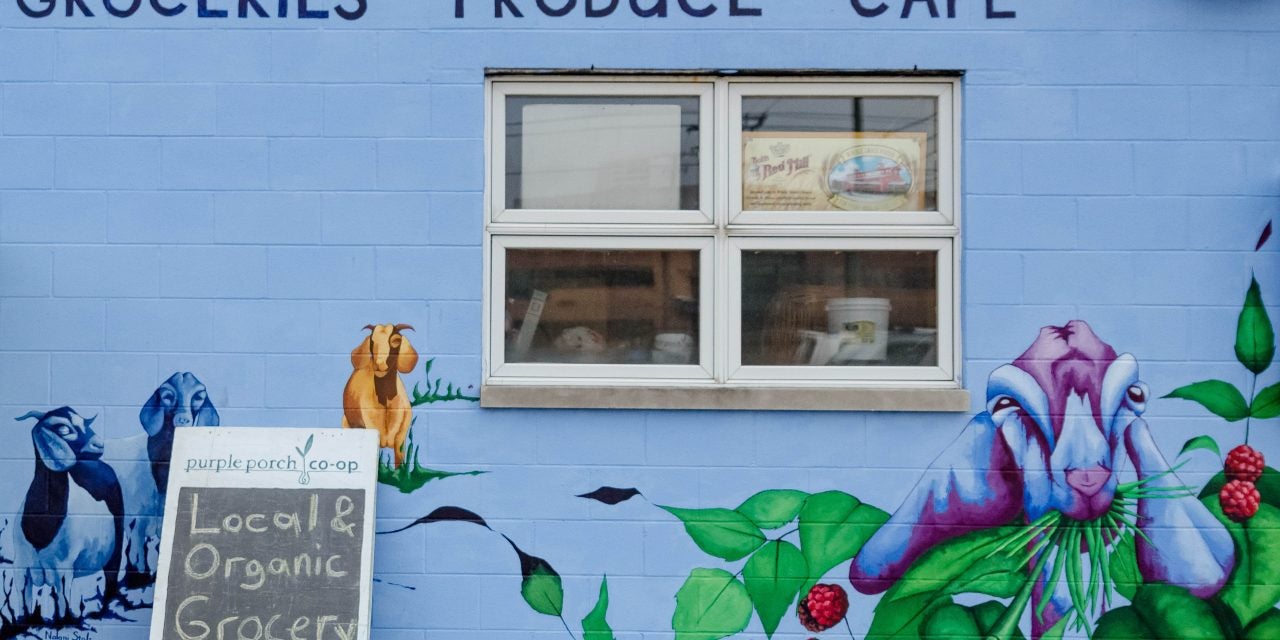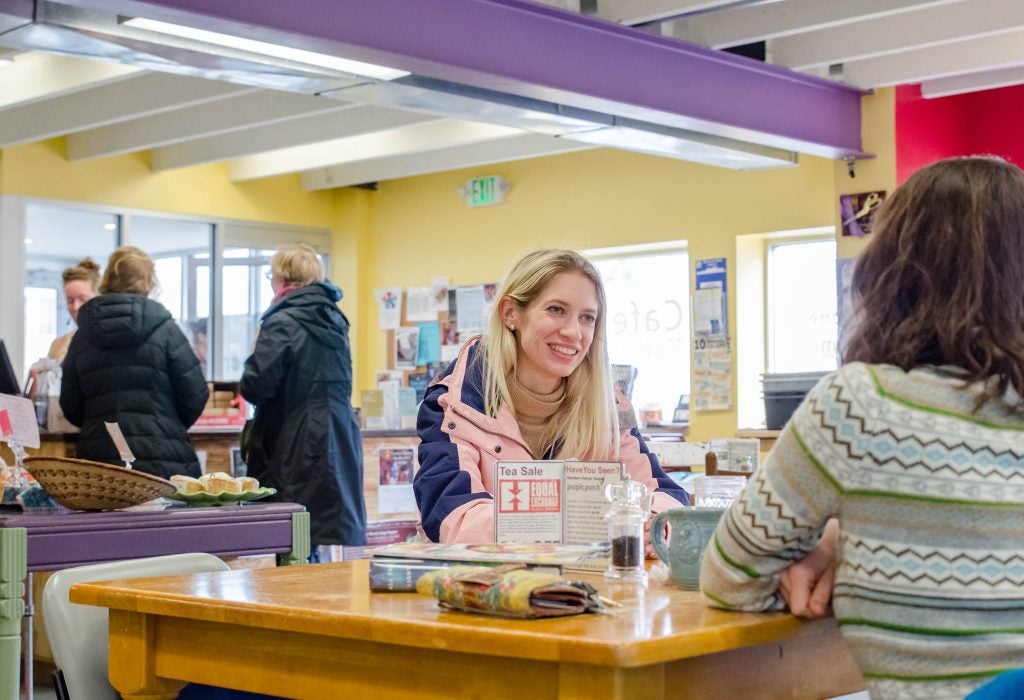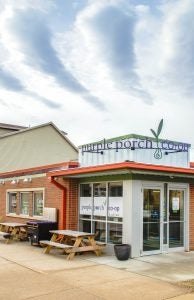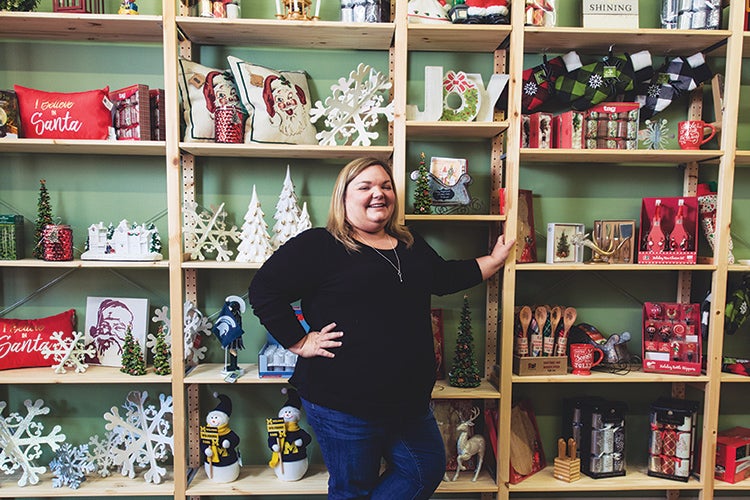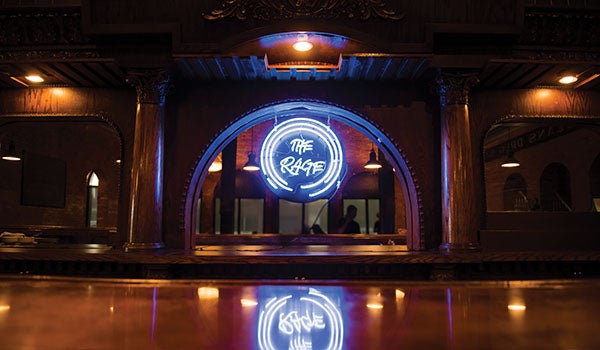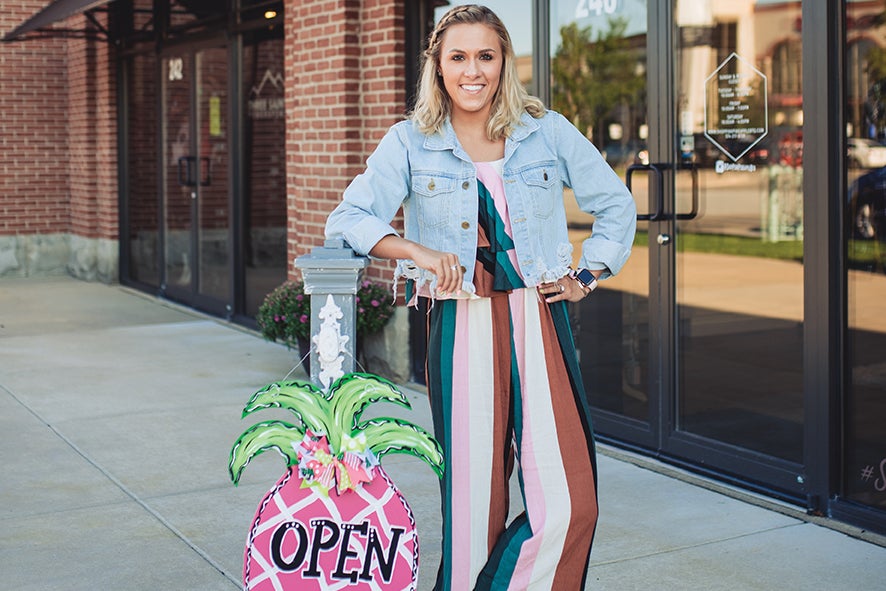The sun was shining in fat golden beams through the large glass windows of South Bend’s Purple Porch Co-op on a crisp winter day.
Customers browsed between aisles eyeing varieties of fresh produce, taking great care to inspect each label.
Myles Robertson, the local foods purchaser for the co-op, emerged from the back room clad in an apron and wearing a smile.
Myles, who has been with the co-op since 2010, has worn a lot of different aprons in his time, which has included customer service management, social media management and data analysis at the store.
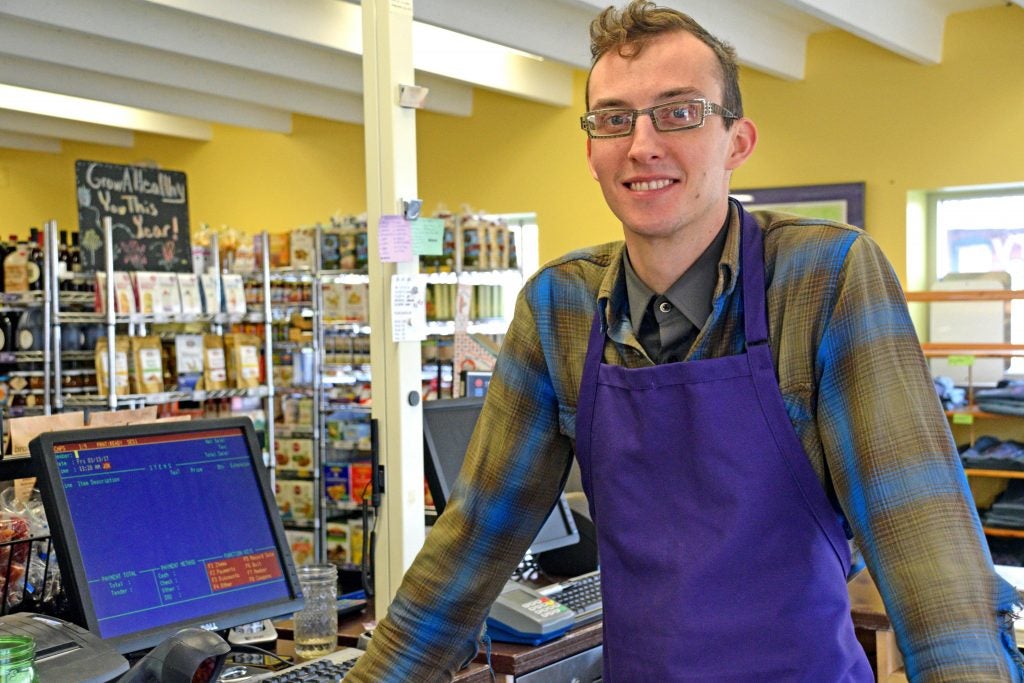
Myles Robertson, the local foods purchaser for Purple Porch Co-op, poses behind the counter on Jan. 13, 2017. (Leader photo/JOE KUHARIC)
However, those three major aspects represent the heart of the co-op: connecting with the community and providing goods and services responsibly.
A co-op thrives on community engagement; its existence demands participation by cooperative partners. Co-op ownership of Purple Porch is open to all members of the public and offers benefits such as discounts on purchases as well as having a vote in the directions the business should take.
Ownership of a co-op places control of the business in the hands of a community instead of a faceless corporation. At Purple Porch, it also connects community members with local and regional growers, suppliers and farmers, with the same values as the
co-op. However, anyone may shop at Purple Porch, regardless of membership.
The customer is always right
Myles admits that taking on as much work as he has has become taxing, but a trip to Zingerman’s in Ann Arbor — famous for its customer service — a few years ago helped him to find focus he now applies to the co-op.
“At the time (I went to Zingerman’s) I was working 80 to 100 hours a week, and I was like, ‘Is there ever a point you don’t work 80 hours a week?’” Myles said. “And (founder Ari Zingerman) said, ‘No. You just get better problems.’ So I’ve kind of embraced that. I’ve always worked 80 hours. (Now) it’s just ‘what do I spend my 80 hours on?’”
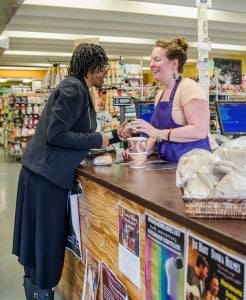
Employee Rachel Berryman (right) laughs along with a customer at Purple Porch Co-op on Feb. 11, 2017. (Leader photo/TIMOTHY J. RITTER)
Some of that energy Myles has been expending has been collecting data to maximize customer service at the co-op, and he is looking to create a “culture book” for employees, a way for them to take their own type of ownership of the co-op.
“(It’s) less, ‘do this. Don’t do that,’” Myles said. “It’s more a kind of attitude that we want people to have here. These are actions that we are trying to foster; you can have your own spin and interpretation of it.”
His goal is not only to make Purple Porch Co-op a better place for people to shop and purchase local foods, but to help foster positive community.
“I think we’re at a decent place as far as product selection goes,” Myles said. “Now (the focus is) more cultivating the customer service aspect, the experience of shopping here.”
Myles has been crunching data that he has gathered for the past year, and is looking to make connections.
“Right now, a lot of it isn’t super complex,” Myles said. “The store is broken up into departments. Every grocery store is. Within each of those departments I’ve broken it into categories that are meaningful to us in some way.”
Like a detective, Myles is looking at each of the departments and observing the information to deduce what is going right and what is not, and how to use that information to best serve co-op customers and members.
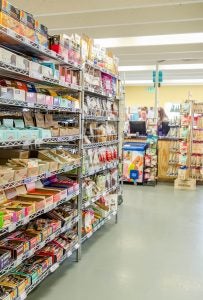
The aisles of Purple Porch Co-op are packed full of local, state and regional choices for community focused purchasers. (Leader photo/TIMOTHY J. RITTER)
“I’m spending a lot of time looking at departments and looking at what I think are, in a way, low hanging fruit categories. Let’s see what’s really going right and what’s not,” he said. “It is looking at top sellers over a month, or over a quarter or over a course of a year. It’s also looking at where are we losing money over the course of a month, a quarter or a year.”
Myles’ hope is that he can graph that data and make projections about the tastes and desires of folks who shop at the co-op in order to offer them foods and services that they want.
He explained that the nature of a co-op is that it owes its existence to a community, and listening to the community is the key to success.
“It’s not that we engage with the community, it’s that our very existence is about engaging with the community,” he said. “It isn’t an afterthought. It isn’t a thing we occasionally do. It’s just what we do.”
That direct, concerted focus on community is something that regular customer and co-op member number 432, Alan Larkin, says he likes to see.
“This is a grocery store in the middle of a former food desert,” Alan said. “It’s a place where residents can come to buy food and don’t have to take their cars and drive some place.”
Alan is a retired professor from IU South Bend who lives within a mile and a half of Purple Porch and says he visits five times a week. He says that the co-op’s marriage of local and organic foods is where it shines the most.
“This is a place that is dedicated to bringing local food and organic food together in one place,” he said. “I think it’s the best of its type in the South Bend/Mishawaka area.”
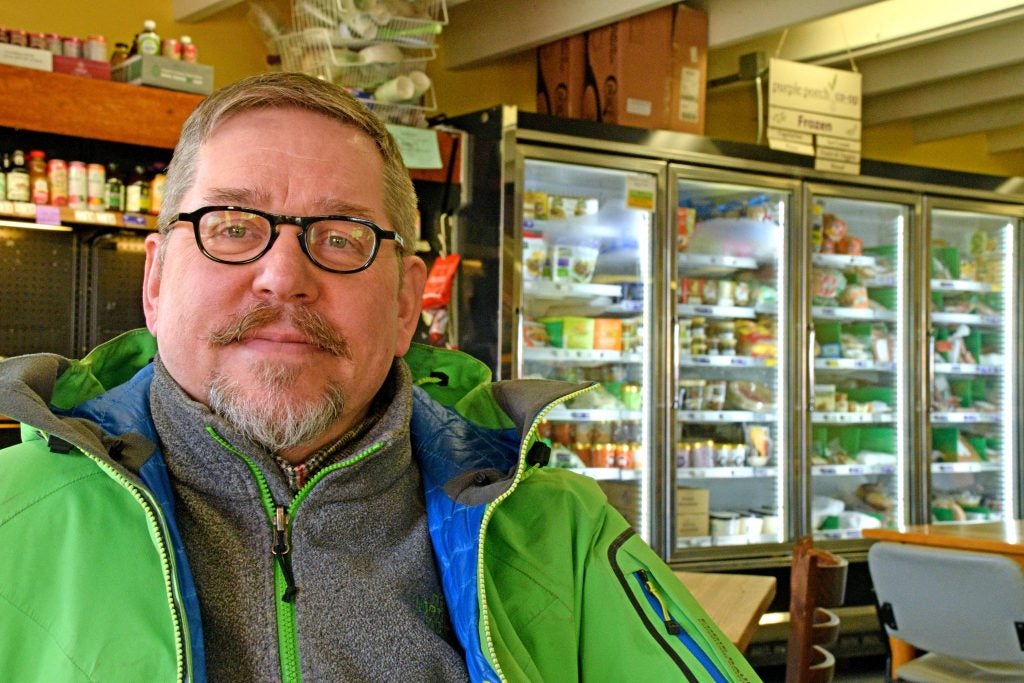
Purple Porch Co-op customer Alan Larkin poses for a snapshot after enjoying his morning meal from Cafe Max at Purple Porch Co-op. (Leader photo/JOE KUHARIC)
More than just a grocery store
Among the shelves of peppers, grains and nuts are regional and local options. For the more adventurous, there are five kombucha teas on tap. And in the middle of the building is the Café Max, which offers prepared food and coffee from Zen Cafe. Larkin starts nearly every day with the café: a breakfast burrito, a cup of coffee and a crossword puzzle.
“I very much like the Café Max, because they’re using these ingredients to make really good food,” he said. “You can come (to the café) and be guaranteed to get something which is nutritious. Certainly everything will be organic. Most of it will be local, and thirdly it’s not going to have a lot of processed food.”
Myles says that in looking forward to 2017, he wants to see the co-op expand with specialty cheeses and meats. But he says that customer input is just as important. In fact, customers can leave direct input at the store and shape the products they are able to buy. Robertson explained that he keeps a running list of products that customers ask for (by name or style) and reviews it once a week to see if it makes sense to start carrying.
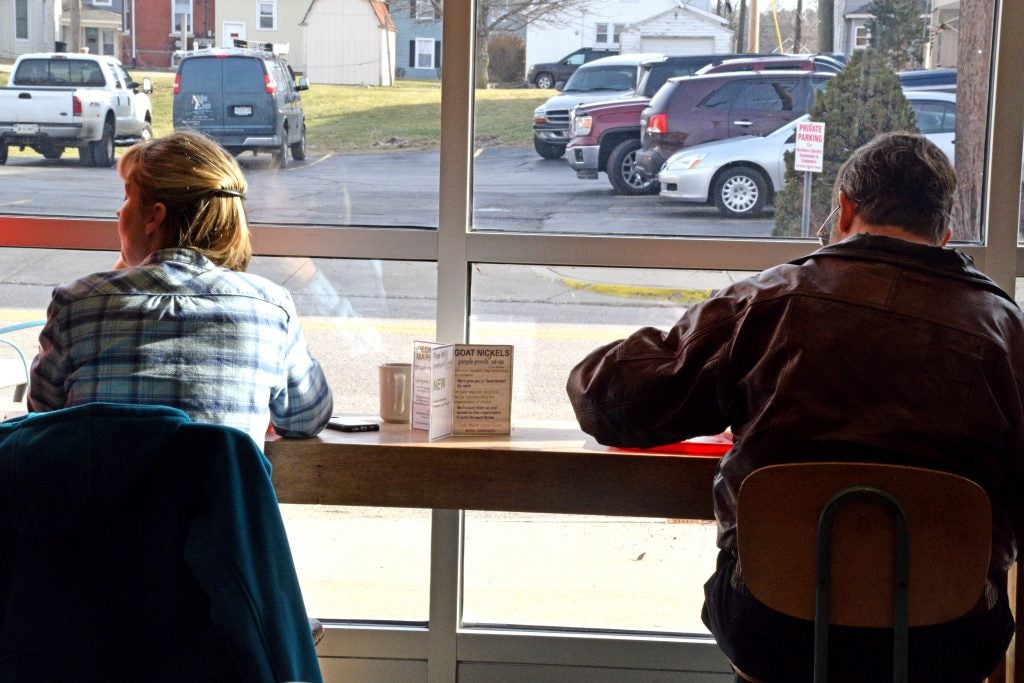
Customers enjoy food and the enjoy the view at the large glass windows at Purple Porch Co-op on Jan. 13, 2017. (Leader photo/JOE KUHARIC)
“You can put your own stamp on what the co-op is,” he said. “A lot of what we are today is based on feedback from people who cared about making this place better.”
Alan has been one of those who have made his mark on the store.
“A couple of times I’ve suggested things, and they’ve been very responsive,” he said. “But, ya know, they can’t always do it.”
Beyond the building, the co-op has a year-round presence at the South Bend Farmers Market, though Myles admits that Indiana weather has an effect.
“In the colder months, it slows down significantly,” he said. “But in May or June we’ll probably do a market launch, with the idea to do more of a festival outside for that.”
Whether it is due to the season or because of customer desires, the co-op is constantly changing. The interaction between seasonality, customer wants and community involvement is what Myles said sets Purple Porch Co-op apart.
“There are many businesses in South Bend that are locally owned,” he said. “(Purple Porch) is locally owned, but at the same time owned by 800 plus people who, for a multitude of reasons, feel there is something of value in this business for them and for the community.”

